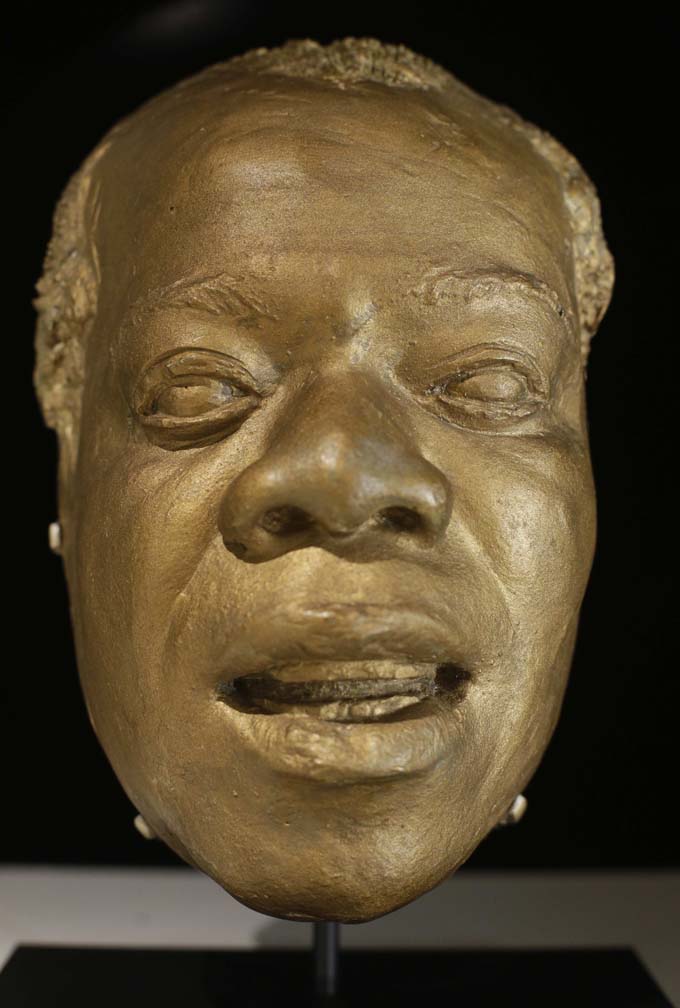
Patrons view items on display at the Louis Armstrong House Museum Wednesday, Oct. 9, 2013, in the Queens borough of New York. (AP Photo/Frank Franklin II)
by Ula Ilnytzky
Associated Press Writer
NEW YORK (AP) — To mark the 10th anniversary of the Louis Armstrong museum in the modest brick house where he lived for 28 years, curators are unveiling one of the jazz trumpeter’s most unusual artifacts — a plaster mask that had been stored in a cupboard for decades.
Armstrong, who documented his career in unusual ways, had the life mask with a painted bronze-patina finish made in the 1950s. David Reese, curator of the Louis Armstrong House Museum, said it reveals creases on his forehead, bags under his eyes and scars on his lips from a lifetime of horn-playing.
A trumpet belonging to Louis Armstrong is on display for patrons at the Louis Armstrong House Museum Wednesday, Oct. 9, 2013, in the Queens borough of New York. The Selmer Trumpet was a gift from King George V in 1933. (AP Photo/Frank Franklin II)
Museum officials still aren’t sure who made the mask, but a photo of Armstrong proudly holding it alongside an unidentified couple may provide clues. Armstrong must have been pleased with it because there are photos showing it hanging in the house at the top of the stairs.
His two-story home in the Corona section of Queens is remarkably understated for the charismatic performer whose improvisational playing style and raspy singing won him fame as far back as the 1920s.
The house and its furnishings, including a funky, blue wood-lacquered kitchen, are virtually unchanged from when Armstrong lived there with his wife, Lucille, from 1943 to 1971, when he died from a heart attack in his bedroom at age 69.
The man known as Satchmo could have lived in a house with “a pool in the shape of a trumpet” but chose to stay in the working-class neighborhood, said Michael Cogswell, director of the national and city landmark.
“Louis wasn’t treated as a celebrity here,” Cogswell said. He could go to the corner barbershop and “wait his turn in line with the other men from the community.”
When Armstrong’s bus would return from a tour, children from the block would help carry his trumpet and suitcases inside the house. “Then Lucille would fix up bowls of ice cream for everybody, and they would watch Westerns together on TV,” Cogswell said.
After Lucille died in 1983, Armstrong’s vast collection of home-recorded tapes, photographs, scrapbooks and other material was donated to Queens College by the Louis Armstrong Educational Foundation. It is the largest publicly held archival collection devoted to a jazz musician in the world.
“The house was frozen in time. It was stuffed,” Cogswell said. “Louis was a packrat.”
Queens Councilwoman Julissa Ferreras said the museum has a long-standing history “as being a mini-mecca for jazz lovers” and that Armstrong’s “spirit and love of music is still very much a part of the community.”

Louis Armstrong’s life mask appears on display at the Louis Armstrong House Museum, Wednesday, Oct. 9, 2013, in the Queens borough of New York. (AP Photo/Frank Franklin II)
Along with the life mask, a 10th anniversary exhibition focuses on Armstrong’s six-week tour of South America in 1957. Armstrong was still reeling over the “Little Rock Nine” school integration crisis in Arkansas weeks earlier, and a photograph shows him in his Buenos Aires hotel room defiantly hanging up on the U.S. ambassador, who had asked him to sing “The Star-Spangled Banner” at that evening’s concert.
More than 100,000 people have visited the museum since its opening.
A new visitor and state-of-the-art multimedia exhibition center with a 72-seat jazz club across the street is scheduled to open in 2016. The massive archive will be moved there, allowing its current exhibition space — the Armstrongs’ basement recreation room — to return to the way it looked originally.
“We want to be in our own way the Graceland of New York City,” Cogswell said.
___
If You Go…
LOUIS ARMSTRONG HOUSE MUSEUM: 34-56 107th St., Corona, Queens; https://www.louisarmstronghouse.org or 718-478-8274. Tuesday-Friday, 10 a.m.-5 p.m., Saturday-Sunday, noon-5 p.m., $10. Tours begin on the hour; last tour at 4 p.m. By subway, No. 7 train to 103rd St.-Corona Plaza.